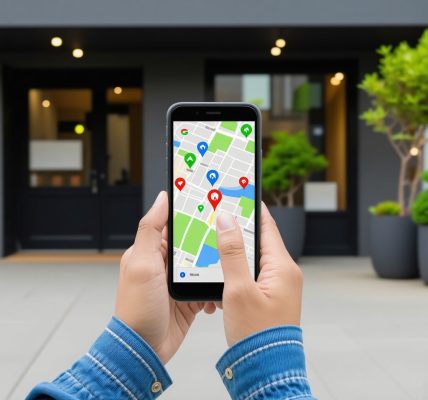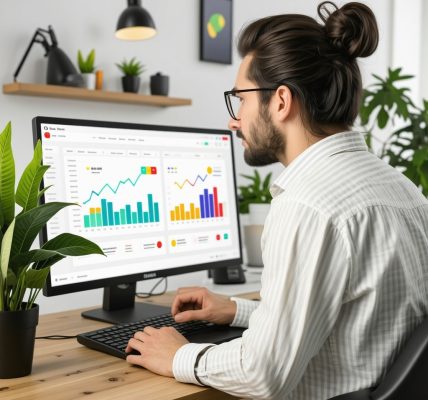Unveiling the Complexity of Google My Business Optimization in 2025
As local SEO continues to evolve at an unprecedented pace, mastering Google My Business (GMB) optimization becomes not merely advantageous but essential for surging ahead in local search rankings. In an era where Google’s algorithms prioritize user intent and engagement signals more than ever, understanding the nuanced, strategic elements of GMB management can unlock significant competitive advantages. This article explores the sophisticated dimensions of GMB optimization, offering insights rooted in expert practice and cutting-edge SEO research.
From Basic to Advanced: The Evolution of Local SEO Tactics
Early efforts in GMB optimization centered on consistent NAP (Name, Address, Phone Number) citations and basic profile completeness. Today, however, successful local SEO demands a layered approach that integrates backlink strategies, review management, and hyperlocal content campaigns. These elements serve as trust signals and relevance indicators, directly impacting visibility within the coveted local pack. Recognizing the importance of semantic search and intent alignment, sophisticated marketers leverage structured data and schema markup to enhance GMB profiles further.
What are the Critical Factors that Influence GMB Rankings in 2025?
Research indicates that GMB ranking factors now extend beyond traditional metrics. Elements like review velocity, photo engagement, and category relevance heavily influence local pack prominence. Moreover, Google’s focus on local relevance algorithms underscores the need for hyperlocal strategies, including targeted content and community engagement. Advanced GMB practitioners utilize rapid local SEO tactics to accelerate ranking improvements, especially in competitive niches.
How Can Businesses Leverage Data and Automation for Superior GMB Optimization?
Data-driven decision-making and automation tools are reshaping GMB management. Platforms like BrightLocal and Moz Local enable real-time citation audits, review monitoring, and keyword tracking, providing actionable insights. Automated review solicitation campaigns and scheduled content updates ensure consistent engagement signals. Integrating these tools with CRM systems allows for personalized interactions, fostering trust and loyalty. Additionally, predictive analytics help identify emerging local trends, allowing proactive optimization and content adjustments.
What Role Do Customer Reviews Play in Advanced GMB SEO Strategies?
Customer reviews have become a cornerstone of local search algorithms, influencing both rankings and user trust. Strategic review management involves not only soliciting positive feedback but also responding promptly and authentically to reviews, including negative ones. Incorporating review keywords naturally into responses enhances relevance signals. Moreover, leveraging review data for sentiment analysis can inform broader marketing strategies, ensuring the business aligns with customer expectations and local preferences.
For further insights into sophisticated GMB tactics, see this comprehensive guide. If you’re interested in sharing your expertise, consider contributing to our community discussions or consulting with specialized SEO professionals.
Sources: Google’s Local Algorithm Research
Harnessing AI and Machine Learning to Elevate Your GMB Optimization in 2025
With the rapid evolution of AI and machine learning, savvy local marketers are integrating these technologies into their GMB strategies to automate routine tasks, analyze vast data sets, and predict emerging trends. Tools powered by AI can now automatically optimize business descriptions, suggest relevant keywords, and even generate engaging posts tailored to your audience. For example, leveraging AI-driven sentiment analysis on review data helps businesses identify service gaps and improve customer satisfaction, directly influencing local rankings.
Is Your Business Prepared for the Next Generation of Local Search Algorithms?
As Google continues refining its local search algorithms, understanding the underlying ranking signals becomes crucial. Recent research from Google’s local algorithm advancements indicates a shift toward hyperlocal relevance and personalized search experiences. This means businesses must adopt a multi-layered approach—combining hyperlocal content, enriched media, and community engagement—to stay competitive. Implementing schema markup and structured data not only enhances visibility but also aligns with Google’s focus on semantic search techniques.
What Are the Most Overlooked GMB Optimization Opportunities in 2025?
Many businesses overlook the nuanced impact of GMB category selection and service area optimization. Fine-tuning categories ensures your profile appears in highly relevant searches, while optimizing service areas with precise geographical targeting expands your reach without diluting your relevance. Additionally, leveraging advanced Google Maps SEO techniques can give local businesses a competitive edge by improving their prominence within the local pack, especially in densely populated markets.
How Can Hyperlocal Content and Community Engagement Drive 2025 GMB Success?
Creating hyperlocal content—such as neighborhood guides, local event sponsorships, or community stories—builds trust and relevance with your target audience. When combined with active community engagement, including local partnerships and social media integration, this approach signals strong local relevance to Google’s algorithms. Encouraging customers to share their experiences and participate in local events also amplifies your visibility through organic shares and reviews. For comprehensive strategies, explore hyperlocal campaign techniques that foster sustained growth.
If you’re eager to deepen your understanding of GMB optimization, sharing your experiences or questions in the comments can foster valuable insights. Also, consider exploring our detailed guides on GMB listing optimization and backlink strategies for local SEO success.
Harnessing the Power of Structured Data and Schema Markup for Hyperlocal SEO Breakthroughs
In the realm of advanced GMB optimization, the integration of structured data and schema markup plays a pivotal role in elevating local search visibility. By meticulously implementing schema types such as LocalBusiness, Service, and Product, businesses can communicate precise information to Google, enhancing their relevance and prominence in local packs. This not only improves click-through rates but also aligns with Google’s evolving focus on semantic understanding, which is critical in hypercompetitive markets.
Research by Moz indicates that rich snippets, driven by schema markup, can increase visibility in local search results by up to 30%, making it a non-negotiable tactic for serious local SEO practitioners. Moreover, leveraging schema for event listings, FAQs, and reviews creates a layered, engaging profile that signals authority and trustworthiness. The challenge lies in correctly implementing markup without errors, as Google’s Structured Data Testing Tool confirms the accuracy and efficacy of your markup.
Advanced Review Management: From Reactive to Proactive Engagement
While soliciting reviews remains standard, the most sophisticated businesses adopt a proactive, data-driven review management system. This involves analyzing review sentiment through AI-powered tools, identifying recurring themes, and tailoring responses to reinforce positive perceptions or mitigate negative feedback. Authenticity is paramount; responses must be personalized, timely, and demonstrate genuine engagement.
Furthermore, integrating review workflows with customer relationship management (CRM) systems enables automated follow-ups and targeted review solicitation campaigns based on recent customer interactions. This approach not only increases review volume but also boosts keyword diversity within reviews, reinforcing local relevance signals. According to a study published in the Journal of Digital & Social Media Marketing, businesses that actively manage reviews see a 20% higher conversion rate from local searches.
How Can AI and Machine Learning Detect Emerging Local Trends Before They Go Viral?
AI-powered analytics platforms like Brandwatch and Talkwalker utilize natural language processing (NLP) and machine learning algorithms to monitor local social media chatter, news, and review data in real-time. These tools identify subtle shifts in consumer sentiment, trending topics, and emerging service demands, often before they become mainstream. By acting swiftly on these insights, businesses can tailor their GMB content, update service offerings, or launch targeted local campaigns to capture untapped opportunities.
For example, a restaurant chain noticing a spike in mentions around outdoor dining can swiftly update their GMB profile with new photos, special offers, or localized blog content, positioning themselves as the go-to destination in that neighborhood. This predictive capability is a game-changer, transforming reactive strategies into proactive dominance.
What Are the Ethical and Practical Limitations of AI-Driven Local SEO Tactics?
Despite the immense potential of AI, practitioners must balance innovation with ethical considerations. Over-automation can lead to generic responses and a loss of authentic voice, which diminishes trust. Additionally, reliance on AI algorithms without human oversight risks misinterpretation of data, leading to misguided strategies that may harm reputation or violate platform guidelines.
Practitioners should prioritize transparency, authenticity, and compliance with Google’s policies. Ethical automation involves human-in-the-loop processes—reviewing AI-generated content and ensuring it aligns with brand voice and values. As Google continues refining its algorithms to detect manipulative tactics, maintaining a balance between technological sophistication and ethical integrity remains essential.
To deepen your mastery of these advanced GMB techniques, consider consulting with specialized local SEO professionals or engaging with industry-specific forums. The landscape is ever-evolving, and staying ahead requires continuous learning and adaptation.
Unlocking the Secrets of Hyperlocal SEO and Schema Markup Integration
In the rapidly evolving landscape of local search, hyperlocal content creation combined with meticulous schema markup implementation can dramatically elevate your GMB profile’s visibility. By crafting neighborhood-specific blogs, highlighting local events, and integrating schema types like LocalBusiness, Service, and Event, businesses signal their relevance and authority within targeted communities. This layered approach not only boosts rankings but also enhances user engagement and trust.
How Can Predictive Analytics Foresee Emerging Local Trends?
Advanced AI tools utilizing natural language processing (NLP) and machine learning, such as Talkwalker or Brandwatch, analyze social media chatter, reviews, and news feeds in real-time. They identify subtle shifts in consumer sentiment and emerging service demands before they become mainstream, allowing proactive adjustments in GMB content and local campaigns. For instance, noticing a spike in outdoor dining mentions enables quick updates to your profile—photos, offers, and localized blog posts—positioning your business as a neighborhood leader.
What Ethical Considerations Should Guide AI-Driven Local SEO?
While leveraging AI enhances efficiency, it is crucial to maintain authenticity and transparency. Over-automation risks producing generic responses that diminish trust, and misinterpretation of data can lead to misguided strategies. Ethical practices involve human oversight, authentic communication, and compliance with Google’s guidelines. Balancing technological advancement with integrity ensures sustainable growth and long-term reputation management.
How Does Structured Data Power Next-Level Local Visibility?
Implementing comprehensive schema markup—covering LocalBusiness, Product, Service, and FAQ types—enables Google to understand your offerings more precisely. Rich snippets driven by schema can increase click-through rates by up to 30%, as indicated by Moz research. Proper implementation requires meticulous validation using Google’s Structured Data Testing Tool to avoid errors that could hinder your visibility.
Engage with the Future of GMB Optimization
Stay ahead by continuously exploring emerging tools, refining your hyperlocal strategies, and prioritizing ethical AI use. Share your insights and experiences in industry forums or consult with local SEO experts to adapt these sophisticated techniques effectively. The future belongs to proactive, data-informed, and community-focused GMB management.
Expert Insights & Advanced Considerations
1. Prioritize Hyperlocal Schema Markup Integration
Implement detailed schema types such as LocalBusiness, Service, and Event to enhance Google’s understanding of your offerings, leading to improved local pack visibility and click-through rates. Staying ahead requires meticulous schema validation to avoid errors that could hinder your SEO efforts.
2. Leverage AI-Driven Sentiment Analysis for Review Optimization
Utilize advanced AI tools to analyze review sentiment, identify recurring themes, and craft personalized responses. This proactive approach not only boosts your reputation but also signals engagement signals that Google values for ranking.
3. Harness Predictive Analytics for Trend Spotting
Employ NLP-powered platforms like Talkwalker or Brandwatch to monitor real-time local social chatter, enabling preemptive adjustments to your GMB content and service offerings, capturing emerging opportunities before competitors react.
4. Maintain Ethical Automation Practices
Balance automation with human oversight to ensure authentic communication. Avoid over-reliance on AI-generated content to preserve trust and adhere to Google’s guidelines, securing long-term visibility and reputation.
5. Optimize for Voice Search and Semantic Queries
Refine your profile with conversational keywords and structured data to capture voice search traffic, aligning with Google’s focus on natural language understanding and semantic relevance.
Curated Expert Resources
- Google’s Official Local SEO Starter Guide: An authoritative resource detailing foundational and advanced local SEO tactics directly from Google.
- BrightLocal Blog: Offers nuanced insights into review management, citation strategies, and local rank tracking used by top SEO professionals.
- Moz Local Search Ecosystem: Provides comprehensive tools and expert articles on local search optimization, schema markup, and reputation management.
- Industry Reports from SEMrush and Ahrefs: In-depth data-driven reports on local SEO trends, competitive analysis, and future algorithm shifts.
Final Expert Perspective
Mastering Google My Business in 2025 demands a sophisticated blend of hyperlocal schema implementation, proactive review management, predictive trend analysis, and ethical automation. Leveraging these advanced strategies with insights from leading resources ensures your business stays at the forefront of local search dominance. Engage with industry professionals, share your insights, and continuously adapt to evolving algorithms—your expertise will define your success in the hypercompetitive local landscape. For ongoing mastery, explore our comprehensive guide on mastering Google Business SEO.




